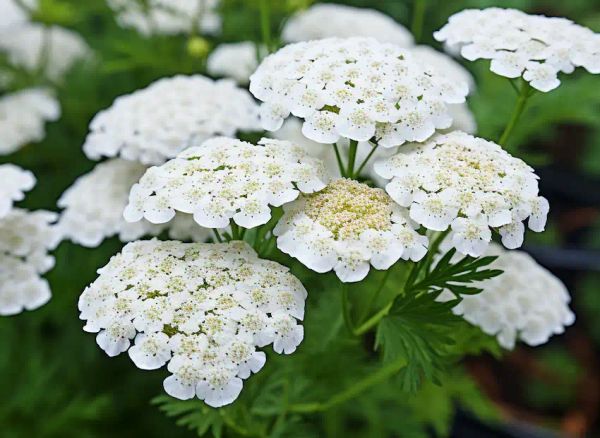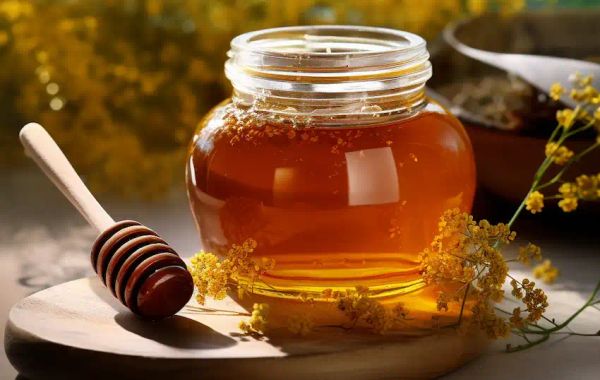Our connection with nature has always been a source of healing and vitality. One such remarkable herb is Yarrow, scientifically known as Achillea millefolium. This unassuming plant has been used for centuries in traditional remedies and is a true treasure trove of wellness benefits.
Discover the Power of Yarrow
Yarrow, also known as milfoil, has a rich history and an impressive range of medicinal properties. It can be used in various forms such as infusions, tinctures, salves, and teas to provide relief and promote healing.
In ancient times, Yarrow was considered a trusted “first aid” remedy, earning it the saying, “Yarroway, a herb will save the day.” While it’s essential to remember that Yarrow is not a replacement for professional medical care, its healing properties should not be underestimated. Let’s explore the amazing benefits of this herb:
Nature’s Healing Arsenal
Yarrow is a botanical powerhouse packed with vital compounds like alkaloids, flavonoids, sesquiterpene lactones, tannins, and essential oils. These components contribute to its extraordinary health-promoting qualities.
- Stop Bleeding: Yarrow is well-known for its ability to staunch bleeding. It has been used to treat wounds and stop bleeding, earning it the nickname “soldier’s woundwort.”
- Soothe Inflammation: Yarrow’s potent anti-inflammatory properties make it valuable for alleviating conditions like arthritis, muscle pain, and menstrual cramps.
- Digestive Relief: Yarrow acts as a digestive tonic, stimulating appetite, easing indigestion, and managing symptoms of irritable bowel syndrome.
- Boost Immunity: Yarrow strengthens the immune system, helping the body fight off infections and recover more quickly.
- Respiratory Support: Yarrow’s expectorant qualities help loosen mucus and ease respiratory discomforts like congestion and coughs.
Ways to Use Yarrow for Healing
Hemorrhage Control
For minor cuts or more significant wounds, apply a poultice of fresh Yarrow leaves to the affected area. It provides swift relief and helps control bleeding.
Anti-Inflammatory Aid
To reduce pain and swelling from chronic conditions like arthritis or muscle pain, take Yarrow as a tincture or apply it topically as a salve.
Digestive Health
Prepare a Yarrow tea by steeping dried leaves and flowers in hot water to alleviate indigestion or stimulate the appetite. Drinking it before meals aids digestion.
Immune Boost
Take Yarrow tinctures or infusions regularly to strengthen your immune system, providing added protection during flu seasons or when you need an extra defense against infections.
Respiratory Relief
Inhale steam from a Yarrow infusion to ease congestion, or consume Yarrow tea to soothe a sore throat or cough. It helps break up mucus and provides relief from respiratory discomfort.
Wound Healing
Create a Yarrow-infused oil or salve by steeping the herb in a carrier oil. Apply topically to wounds, bruises, or sore muscles to speed up the healing process.
Menstrual Support
Yarrow’s ability to alleviate menstrual cramps and regulate blood flow makes it a valuable ally for women’s health. Consume Yarrow tea or tincture as needed during your menstrual cycle.
Skin Care
Incorporate Yarrow into homemade skincare products like toners or facial steams to address issues like acne or inflammation.
Harnessing the Healing Potential of Yarrow
There are various ways to harness the healing potential of Yarrow:
- Tincture: Make a Yarrow tincture by filling a glass jar with dried Yarrow flowers and leaves and pouring high-proof alcohol over them. Take 3-5 ml of Yarrow tincture three times a day for immediate relief or as an immune system booster.
- Infusion: Prepare a Yarrow infusion by steeping dried leaves and flowers in hot water. Drink it three times a day to combat inflammation, digestive problems, or respiratory issues.
- Salve: Create a Yarrow salve by infusing dried Yarrow leaves and flowers into a carrier oil like olive oil. Mix it with melted beeswax to make a salve for wound care or pain relief.
- Tea: Make Yarrow tea by steeping dried leaves and flowers in hot water. Drink it before meals for digestion or to enjoy a relaxing herbal infusion.
- Steam Inhalation: Inhale the steam from a Yarrow infusion to ease congestion and soothe a sore throat.
- Poultices: Apply a paste made from fresh Yarrow leaves directly to wounds, insect bites, or skin irritations for relief from pain and inflammation.
- Yarrow Oil: Make a concentrated infusion of Yarrow in carrier oil for massage or as a base for homemade skincare products.
- Yarrow Bath: Add Yarrow-infused water to your bath to promote relaxation, soothe sore muscles, and benefit the skin.
- Yarrow Compress: Soak a cloth in a strong Yarrow infusion and apply it directly to the affected area for targeted relief from arthritis or pain.
- Yarrow Honey: Infuse Yarrow leaves and flowers into honey for a flavorful natural sweetener or for soothing a sore throat.
Equipped with the knowledge of these remarkable properties, embrace the wonders of Yarrow. Nature provides us with a powerful ally in our pursuit of well-being through the magnificent Yarrow. As the ancients said, “Yarroway, a herb will save the day.” 






